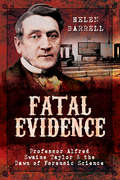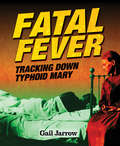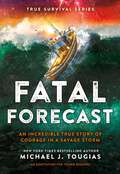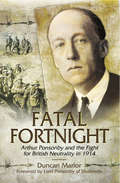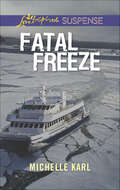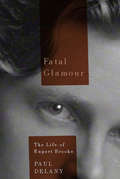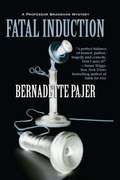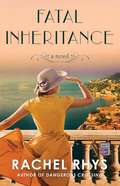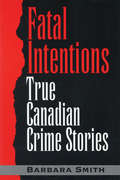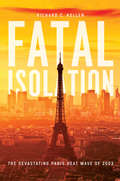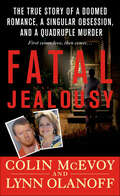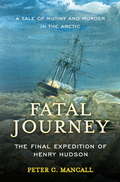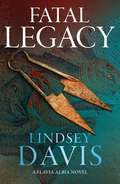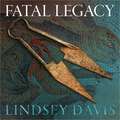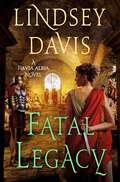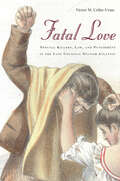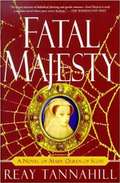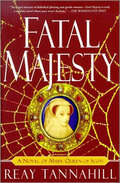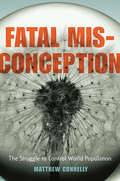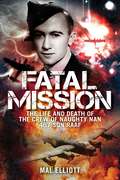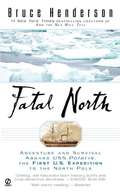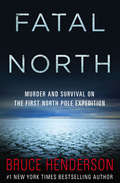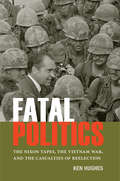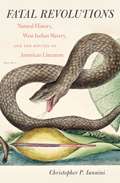- Table View
- List View
Fatal Evidence: Professor Alfred Swaine Taylor & the Dawn of Forensic Science
by Helen Barrell&“An engrossing read . . . Her description of the ways in which forensic experiments evolved is as fascinating as the courtroom dramas they accompanied.&” —Jess Kidd, The Guardian, &“Best Summer Books 2018, as Picked by Writers&” A surgeon and chemist at Guys Hospital in London, Professor Alfred Swaine Taylor used new techniques to search the human body for evidence that once had been unseen. As well as tracing poisons, he could identify blood on clothing and weapons, and used hair and fiber analysis to catch killers. Taylor is perhaps best remembered as an expert witness at one of Victorian England&’s most infamous trials—that of William Palmer, &“The Rugeley Poisoner.&” But he was involved in many other intriguing cases, from a skeleton in a carpet bag to a fire that nearly destroyed two towns, and several poisonings in between. Taylor wrote widely on forensic medicine. He gave Charles Dickens a tour of his laboratory, and Wilkie Collins owned copies of his books. His work was known to Sir Arthur Conan Doyle, and he inspired the creation of fictional forensic detective Dr. Thorndyke. For Dorothy L. Sayers, Taylors books were the back doors to death. From crime scene to laboratory to courtroom and sometimes to the gallows, this is the world of Professor Alfred Swaine Taylor and his fatal evidence. &“A must read for any lover of crime writing, criminology, and Victorian cultural history.&” —Fortean Times &“Totally fascinating . . . Refers to many famous and not-so-famous cases, as well as giving an insight into this clever, enthusiastic, honourable and dedicated man. Very clearly written and very enjoyable read.&” —Michelle Birkby, author of The Baker Street Inquiries series
Fatal Fever: Tracking Down Typhoid Mary
by Gail JarrowIn the early 1900s, when typhoid fever was killing tens of thousands of Americans each year, Mary Mallon was employed as a cook by several well-to-do New York families. <P><P>When some members of these households developed the disease, suspicion turned to Mary. Did she have anything to do with the spread of the deadly bacteria? <P>Here is the gripping, true story of Typhoid Mary; the epidemiologist who discovered her trail of infection; and the health department that decided her fate. Fatal Fever will keep readers on the edges of their seats as they wonder what will happen next. <P>Award-winning science and history writer Gail Jarrow brings her expertise to this engrossing medical mystery. Extensive back matter includes a glossary, a timeline, and a list of well-known typhoid sufferers and victims.
Fatal Forecast: An Incredible True Story of Courage In a Savage Storm (True Survival Series #2)
by Michael J. TougiasAs harrowing as The Perfect Storm—but with a miraculous ending—Fatal Forecast is one of the greatest survival stories ever told—now available as a young readers edition.★ "Plunges into the action with pulse-pounding panache…. Readers will be rooting for all these courageous men in this thrilling, edge-of-your-seat survival tale." —Booklist, starred review On the morning of November 21, 1980, two small boats set out from Cape Cod for Georges Bank, a prosperous fishing ground one hundred miles out to sea. The National Weather Service had forecast typical fall weather, and the young crew aboard the Sea Fever and the Fair Wind had no reason to expect that this trip would be any different from the dozens they&’d made earlier in the season. What they didn&’t know was that the only weather buoy in the area was malfunctioning as the National Weather Service had failed to reveal this critical data. As the two boats headed out, a colossal storm was brewing, a furious maelstrom that would batter the boats with sixty-foot waves and hurricane-force winds. This true story of catastrophe and survival at sea is a vivid moment-by-moment account of seventy-two hours in the lives of eight men. Most amazing is the story of Ernie Hazard, who spent more than fifty terrifying hours in—and out of—a tiny life raft, careening in the monstrous waves. Gripping and heart-pounding, this page-turning young readers edition is an unforgettable story about the collision of two spectacular forces: the brutality of nature and the human will to survive. An adaptation for young readers of Fatal Forecast: An Incredible True Tale of Disaster and Survival at Sea."Middle and early high school readers who love a gripping adventure or survival story will tear through this one. Highly recommended." —School Library Journal
Fatal Fortnight: Arthur Ponsonby and the Fight for British Neutrality 1914
by Duncan MarlorMuch has been published about how Britain's ruling circle came to its decision for war in 1914 but little about what rank and file Members of Parliament thought and did as the continental 'Armageddon' drew closer. Fatal Fortnight tells the story of Arthur Ponsonby, and his backbench Liberal Foreign Affairs Committee. The book describes the suspense around Parliament as the skies darkened. It tells how, after the Foreign Secretary made his proposal that Britain should go in, Ponsonby's friend Philip Morrell stood up and called for a general debate, in the teeth of the fury of those who wanted Britain to get straight into the war. It describes how the neutralists, led by Ponsonby, made their passionate case in the fateful hours as Britain hung between peace and war.The book looks at the concealment from Parliament of the military understanding with France, and the issues of war and democracy which are still with us today. It re-examines the arguments and reflects on how the world might have been had the 1914 decision gone a different way.Alongside the political drama a human story emerges of how family support for Ponsonby and his allies sustained them as the world closed in.
Fatal Freeze
by Michelle KarlDEADLY REUNION CIA agent Shaun Carter is on the trail of an international crime ring, and the sudden appearance of a woman from his past could jeopardize his mission. Missing persons investigator Lexie Reilly's search for a missing teen has put her in the criminals' crosshairs. Joining forces to take down this ring is their only chance of survival. Shaun vows to keep the beautiful investigator out of harm's way and help her find the lost girl. But when their ferry becomes icebound, they are trapped at sea with killers who will stop at nothing to keep them from discovering their secrets.
Fatal Glamour: The Life of Rupert Brooke
by Paul DelanyRupert Brooke (b. 1887) died on April 23, 1915, two days before the start of the Battle of Gallipoli, and three weeks after his poem "The Soldier" was read from the pulpit of St Paul's Cathedral on Easter Sunday. Thus began the myth of a man whose poetry crystallizes the sentiments that drove so many to enlist and assured those who remained in England that their beloved sons had been absolved of their sins and made perfect by going to war. In Fatal Glamour, Paul Delany details the person behind the myth to show that Brooke was a conflicted, but magnetic figure. Strikingly beautiful and able to fascinate almost everyone who saw him - from Winston Churchill to Henry James - Brooke was sexually ambivalent and emotionally erratic. He had a series of turbulent affairs with women, but also a hidden gay life. He was attracted by the Fabian Society’s socialist idealism and Neo-Pagan innocence, but could be by turns nasty, misogynistic, and anti-Semitic. Brooke’s emotional troubles were acutely personal and also acutely typical of Edwardian young men formed by the public school system. Delany finds a thread of consistency in the character of someone who was so well able to move others, but so unable to know or to accept himself. A revealing biography of a singular personality, Fatal Glamour also uses Brooke’s life to shed light on why the First World War began and how it unfolded.
Fatal Induction
by Bernadette PajerSeattle, 1901. The race to win an electrical competition incites Professor Bradshaw's obsession for invention in this sequel to A SPARK OF DEATH. The winner's telephonic system will deliver music of the Seattle Grand Theater to homes throughout the city, and Bradshaw is confident he can win. But a missing peddler and child divert him, while the assassination of President McKinley drops Bradshaw and the entire nation into shock. When Bradshaw discovers the peddler's child may have witnessed a murder, he follows her trail below Yesler Way, plunging into a seedy underworld of bars and brothels. Frustrated by the police department's apathy and caught between power struggles, he doesn't know who to trust. Each step of his investigation entangles him deeper in crime and corruption until he realizes that to save the peddler's child, he must transform his contest entry into a trap to catch a killer. The Professor Bradshaw Mystery Series features Benjamin Bradshaw, Professor of Electrical Engineering at the University of Washington. Bradshaw's electrical forensic and investigative skills, combined with a keen understanding of human nature, bring the Seattle Police, and murder, frequently to his doorstep during the social and scientific turmoil of the early twentieth century.
Fatal Inheritance: A Novel
by Rachel RhysGet swept away to the enchanting South of France with this “exquisite and shimmering” (Lisa Jewell, New York Times bestselling author of Then She Was Gone) suspenseful historical novel, where perilous secrets lurk under the glitz and glam of seaside wealth. She didn’t have an enemy in the world…until she inherited a fortune. London 1948: Eve Forrester is stuck in a loveless marriage, isolated in her gray and gloomy house when out of the blue, she receives a letter. A wealthy stranger has left her a mysterious inheritance but in order to find out more, she must travel to the glittering French Riviera. There, Eve discovers she has been bequeathed an enchanting villa overlooking the Mediterranean Sea and suddenly, life could not be more glamorous. But while she rubs shoulders with the rich and famous, challengers to her unexplained fortune begin to emerge—challengers who would love to see Eve gone forever. Alone in paradise, Eve must unlock the story behind her surprise bequest—before her unexpected twist of fate turns deadly… With Rachel Rhys’s “thrilling, seductive, and utterly absorbing” (Paula Hawkins, #1 bestselling author of The Girl on the Train) prose, Fatal Inheritance is an intoxicating story of dysfunctional families and long-hidden secrets, set against the decadence of the Côte d’Azur.
Fatal Intentions: True Canadian Crime Stories
by Barbara SmithCanadians are very polite — but they also commit murder. And those who think that mass homicides and wanton killings are recent phenomena in Canada should treat themselves to Fatal Intentions. Using contemporary accounts, Barbara Smith vividly recreates a number of murder cases from 1920s Nova Scotia to 1980s British Columbia. Some, like the Boyd Gang adventures, are still remembered often inaccurately or romantically; others, like the murder of Flora Gray in Yarmouth, or the murder of twenty-three innocents in Quebec in 1949, can now be recalled by only a few. In some cases, the “truth” may exist only in dusty archives; in others, the truth may have gone to the graves of the victims — or the accused. Robert Cook’s killing spree — all seven in his family — in Stettler, Alberta, will probably be recounted, locally, for generations. But, did he do it? Toronto’s Boyd Gang boasted about hot cars and beautiful women — the stuff of folklore. And newspaper writers of that time were only too willing to add to the romantic tales. The last woman to be hanged in Canada, her disabled brother, and his employer all went to the gallows — two for greed, one for lust. These and other stories are part of our history — and often part of our folklore. They also can remind us that human nature doesn’t change easily, over decades or distances. Greed, lust, and other deadly sins can lead to fatal intentions, anytime, anywhere.
Fatal Isolation: The Devastating Paris Heat Wave of 2003
by Richard C. KellerIn a cemetery on the southern outskirts of Paris lie the bodies of nearly a hundred of what some have called the first casualties of global climate change. They were the so-called abandoned victims of the worst natural disaster in French history, the devastating heat wave that struck in August 2003, leaving 15,000 dead. They died alone in Paris and its suburbs, and were then buried at public expense, their bodies unclaimed. They died, and to a great extent lived, unnoticed by their neighbors--their bodies undiscovered in some cases until weeks after their deaths. Fatal Isolation tells the stories of these victims and the catastrophe that took their lives. It explores the multiple narratives of disaster--the official story of the crisis and its aftermath, as presented by the media and the state; the life stories of the individual victims, which both illuminate and challenge the ways we typically perceive natural disasters; and the scientific understandings of disaster and its management. Fatal Isolation is both a social history of risk and vulnerability in the urban landscape and a story of how a city copes with emerging threats and sudden, dramatic change.
Fatal Jealousy: The True Story of a Doomed Romance, a Singular Obsession, and a Quadruple Murder
by Colin McEvoy Lynn OlanoffThe shocking, true story of Pennsylvania mass murderer Michael Ballard who received the death sentence for his crimes—includes eight pages of dramatic photos.Out of controlJune 26, 2010. A Pennsylvania State Trooper, heading home from work, witnesses a car speeding and crashing into trees. Stopping to help, he finds that the driver, Michael Ballard, is alive—and drenched in blood. When asked what happened, the man answers: “I just killed everybody.”Out of his mindNot far from the accident, police make a gruesome discovery in the home of Michael’s ex-girlfriend, Denise Mehri. Four bodies are found, stabbed repeatedly with a knife: Denise on the kitchen floor; her grandfather, in his wheelchair; her neighbor, who tried to help; and her father, in a room with a blood-smeared obscenity painted on the wall. How could anyone do something so sinister?Out of time . . .Michael had already been convicted of murder when he was only eighteen. Despite several misconducts during his time in prison, he was found suitable for parole shortly after his minimum sentence lapsed. But this time, his deadly rampage would not be so easily pardoned. From authors Colin McEvoy and Lynn Olanoff, this is the shocking true story about four innocent people who fell prey to one man’sFatal jealousy.
Fatal Journey: The Final Expedition of Henry Hudson
by Peter MancallThe English explorer Henry Hudson devoted his life to the search for a water route through America, becoming the first European to navigate the Hudson River in the process. In Fatal Journey, acclaimed historian and biographer Peter C. Mancall narrates Hudson’s final expedition. In the winter of 1610, after navigating dangerous fields of icebergs near the northern tip of Labrador, Hudson’s small ship became trapped in winter ice. Provisions grew scarce and tensions mounted amongst the crew. Within months, the men mutinied, forcing Hudson, his teenage son, and seven other men into a skiff, which they left floating in the Hudson Bay. A story of exploration, desperation, and icebound tragedy, Fatal Journey vividly chronicles the undoing of the great explorer, not by an angry ocean, but at the hands of his own men.
Fatal Legacy (Flavia Albia)
by Lindsey DavisAn unpaid bar bill leads Flavia Albia to her most bitter and complex case yet. Decades earlier Appius Tranquillus Surus wrote his will: it freed his slaves and bequeathed his businesses to them. He left an orchard to the Prisci, a family he was friendly with, on the condition that his freedmen could still take its harvest. The convoluted arrangement has led to a feud between the two families, each of which has its own internal strife. Endless claims and counterclaims lead to violence and even death. Lawyers have given up in exasperation as the case limps on. The original will has disappeared, along with a falsified codicil - and might there be another one?But is there a solution? Two youngsters from each side of the divide, Gaius Venuleius and Cosca Sabatina, have fallen in love, which could unite the feuding families. There is only one problem: were Sabatina's grandmother and father really liberated in the Surus will? If not, the stigma of slavery will stop the marriage and the dispute will rage on forever.Reconciliation seems impossible, but Albia will try. Her investigation must cut through decades of secrets, arguments, lies and violence to reach a startling truth.Praise for Lindsey Davis and the Flavia Albia series'It positively crackles with knowledge of the city and its people, mixed with social comment, ingenious and bloody plots and sharp observational skills leavened by more than a smattering of genuine and sometimes earthy humour' Crime Review'Fiendishly twisted mystery' Mail on Sunday'Great fun, shot through with sharp observations' SHOTS'In this witty novel by the mistress of Roman crime, the reader is transported behind the scenes of a Triumph into a fascinating world of actors, costumiers and animal trainers, all united in their hatred of the murdered man' Sunday Express Magazine
Fatal Legacy (Flavia Albia)
by Lindsey DavisAn unpaid bar bill leads Flavia Albia to her most bitter and complex case yet. Decades earlier Appius Tranquillus Surus wrote his will: it freed his slaves and bequeathed his businesses to them. He left an orchard to the Prisci, a family he was friendly with, on the condition that his freedmen could still take its harvest. The convoluted arrangement has led to a feud between the two families, each of which has its own internal strife. Endless claims and counterclaims lead to violence and even death. Lawyers have given up in exasperation as the case limps on. The original will has disappeared, along with a falsified codicil - and might there be another one?But is there a solution? Two youngsters from each side of the divide, Gaius Venuleius and Cosca Sabatina, have fallen in love, which could unite the feuding families. There is only one problem: were Sabatina's grandmother and father really liberated in the Surus will? If not, the stigma of slavery will stop the marriage and the dispute will rage on forever.Reconciliation seems impossible, but Albia will try. Her investigation must cut through decades of secrets, arguments, lies and violence to reach a startling truth.Praise for Lindsey Davis and the Flavia Albia series'It positively crackles with knowledge of the city and its people, mixed with social comment, ingenious and bloody plots and sharp observational skills leavened by more than a smattering of genuine and sometimes earthy humour' Crime Review'Fiendishly twisted mystery' Mail on Sunday'Great fun, shot through with sharp observations' SHOTS'In this witty novel by the mistress of Roman crime, the reader is transported behind the scenes of a Triumph into a fascinating world of actors, costumiers and animal trainers, all united in their hatred of the murdered man' Sunday Express Magazine
Fatal Legacy (Flavia Albia)
by Lindsey DavisThe next witty, must-listen audiobook in the Flavia Albia series.An unpaid bar bill leads Flavia Albia to her most bitter and complex case yet. Decades earlier Appius Tranquillus Surus wrote his will: it freed his slaves and bequeathed his businesses to them. He left an orchard to the Prisci, a family he was friendly with, on the condition that his freedmen could still take its harvest. The convoluted arrangement has led to a feud between the two families, each of which has its own internal strife. Endless claims and counterclaims lead to violence and even death. Lawyers have given up in exasperation as the case limps on. The original will has disappeared, along with a falsified codicil - and might there be another one?But is there a solution? Two youngsters from each side of the divide, Gaius Venuleius and Cosca Sabatina, have fallen in love, which could unite the feuding families. There is only one problem: were Sabatina's grandmother and father really liberated in the Surus will? If not, the stigma of slavery will stop the marriage and the dispute will rage on forever.Reconciliation seems impossible, but Albia will try. Her investigation must cut through decades of secrets, arguments, lies and violence to reach a startling truth.Praise for Lindsey Davis and the Flavia Albia series'It positively crackles with knowledge of the city and its people, mixed with social comment, ingenious and bloody plots and sharp observational skills leavened by more than a smattering of genuine and sometimes earthy humour' Crime Review'Fiendishly twisted mystery' Mail on Sunday'Great fun, shot through with sharp observations' SHOTS(P) 2023 Hodder & Stoughton Limited
Fatal Legacy: A Flavia Albia Novel (Flavia Albia Series #11)
by Lindsey DavisIn first century Rome, Flavia Albia takes on an easy case that soon proves to be anything but as, at every turn, bodies—old and new—dog her path.Flavia Albia, daughter of Marcus Didius Falco, has taken over her father's business as a private informer. She only has two hard and fast rules - avoid political cases and family cases because nothing good comes of either of them. Unfortunately, since Albia isn't good at avoiding either, it's really more of a guideline. So when her Aunt Junia demands Albia track down a couple of deadbeats who owe her money, it's an offer Albia can't refuse.It turns out to be a relatively easy job, requiring only some half-hearted blackmail, and it leads to some new work - tracking down some essential paperwork for the debtor family. But nothing is truly easy in Rome - if Albia doesn't find the paperwork that proves that family's ancestor was a properly freed slave, the family could lose everything. The more she digs, the more skeletons she finds in their closet, until murder in the past leads to murder in the present. Now, it's serious, even deadly, and Albia has precious little time to uncover thetruth.
Fatal Love
by Victor Uribe-UranOne night in December 1800, in the distant mission outpost of San Antonio in northern Mexico, Eulalia Californio and her lover Primo plotted the murder of her abusive husband. While the victim was sleeping, Prio and his brother tied a rope around Juan Californio's neck. One of them sat on his body while the other pulled on the rope and the woman, grabbing her husband by the legs, pulled in the opposite direction. After Juan Californio suffocated, Eulalia ran to the mission and reported that her husband had choked while chewing tobacco. Suspicious, the mission priests reported the crime to the authorities in charge of the nearest presidio. For historians, spousal murders are significant for what they reveal about social and family history, in particular the hidden history of day-to-day gender relations, conflicts, crimes, and punishments. Fatal Love examines this phenomenon in the late colonial Spanish Atlantic, focusing on incidents occurring in New Spain (colonial Mexico), New Granada (colonial Colombia), and Spain from the 1740s to the 1820s. In the more than 200 cases consulted, it considers not only the social features of the murders, but also the legal discourses and judicial practices guiding the historical treatment of spousal murders, helping us understand the historical intersection of domestic violence, private and state/church patriarchy, and the law.
Fatal Majesty: A Novel of Mary, Queen of Scots
by Reay TannahillHistorical fiction about 18-year-old Mary who returns from the sophisticated French court to claim her throne in cold, backward Scotland.
Fatal Majesty: A Novel of Mary, Queen of Scots
by Reay TannahillIn Fatal Majesty, critically acclaimed novelist Reay Tannahill immerses readers in the tragedy of Mary, Queen of Scots-but this is not a conventional retelling of a fascinating yet familiar tale.Eighteen-year-old Mary returns from the sophisticated French court to claim her throne in cold, backward Scotland. A gloomy reception proves least among the na?ve young monarch's challenges: her arrival provides the opportunity for smoldering vendettas to explode and for intricate conspiracies to form and then unravel-intrigue besets her on every side. Mary's self-righteous brother, James, seeks to rule in her place; her brilliant Secretary of State, Lethington, dedicates his energies to placing the Stuarts on the throne of England; and her cousin, Elizabeth I, dazzling and unscrupulous, fears Mary as a threat to her crown and to her life.Mingling a poet's passion with an historian's insight, Tannahill chronicles an era of easy violence, desperate action, and grand conspiracy. In Fatal Majesty, masterful characterization combines with lightning pace and classic plotting to deliver a tragic romantic saga with all the complexity of a major political thriller.
Fatal Misconception: The Struggle to Control World Population
by Matthew ConnellyListen to a short interview with Matthew Connelly Host: Chris Gondek | Producer: Heron & Crane Fatal Misconception is the disturbing story of our quest to remake humanity by policing national borders and breeding better people. As the population of the world doubled once, and then again, well-meaning people concluded that only population control could preserve the "quality of life." This movement eventually spanned the globe and carried out a series of astonishing experiments, from banning Asian immigration to paying poor people to be sterilized. Supported by affluent countries, foundations, and non-governmental organizations, the population control movement experimented with ways to limit population growth. But it had to contend with the Catholic Church's ban on contraception and nationalist leaders who warned of "race suicide." The ensuing struggle caused untold suffering for those caught in the middle--particularly women and children. It culminated in the horrors of sterilization camps in India and the one-child policy in China. Matthew Connelly offers the first global history of a movement that changed how people regard their children and ultimately the face of humankind. It was the most ambitious social engineering project of the twentieth century, one that continues to alarm the global community. Though promoted as a way to lift people out of poverty--perhaps even to save the earth--family planning became a means to plan other people‘s families. With its transnational scope and exhaustive research into such archives as Planned Parenthood and the newly opened Vatican Secret Archives, Connelly's withering critique uncovers the cost inflicted by a humanitarian movement gone terribly awry and urges renewed commitment to the reproductive rights of all people.
Fatal Mission: The Life and Death of the Crew of the Naughty Nan 467 SQN RAAF
by Mal ElliottFatal Mission is the story of Australian navigator Oscar Furniss, just one of 55,000 young men who perished while flying for Bomber Command during World War II. Lovingly crafted by his nephew, Mal Elliott, this book brings to life a young man whose name was never spoken by his family and who was a stranger to his modern-day descendants. Elliott follows Oscar from his carefree childhood in the Blue Mountains through his training over the vast emptiness of Canada to the mist-shrouded patchwork landscapes of Britain and on to the hostile skies of occupied France. He uses the accounts of the two surviving aircrew to piece together the events of the fateful night that saw most of the crew of Lancaster JA901, affectionately know as Naughty Nan , perish as pilot Colin Dickson heroically manoeuvred his burning aircraft away from the towns and villages that dotted the landscape. This has been a difficult book for Elliott to write as it contains a harrowing description of his uncle’s last moments. The terrible impact of the deaths of the aircrew are vividly described alongside the miraculous tales of the two survivors. But for the family of Oscar Furniss there would be no miracle, just the lingering weight of deep and lasting grief. This is a story that moves beyond the technical descriptions of bombing missions to describe the human toll of conflict. It underlines the crucial importance of commemoration, of refusing to allow those who perished in war to be forgotten. Theirs was a sacrifice that we who live in freedom should never forget.
Fatal North
by Bruce HendersonIt began as America's first attempt to reach the North Pole. It ended with the captain's suspicious death, a brutal struggle for survival on the polar ice, and a government cover-up. Fatal North is a harrowing account of one of the great tragedies in the history of United States exploration.
Fatal North: Murder and Survival on the First North Pole Expedition
by Bruce HendersonThe #1 New York Times bestselling author reveals &“the chilling story&” of disaster and suspected murder on the19th century Polaris expedition (Vincent Bugliosi, author of Helter Skelter)Sponsored by the United States government, the Polaris expedition of 1871 was intended to be the first to reach the North Pole. By its end, the ship was sunk, Captain Charles Hall was dead under suspicious circumstances, and thirty-three men, women, and children were struggling to survive while stranded on the polar ice for six months.News of the disastrous expedition and accusations of murder lead to a national scandal, an official investigation, and a government cover-up. The true cause of the captain&’s death remained unknown for nearly 100 years, until Charles Hall&’s grave was found by a search party and opened.#1 New York Times bestselling author Bruce Henderson combines the transcripts of the U.S. Navy&’s original inquest, the personal papers of Captain Hall, as well as his autopsy and forensic reports relating to his death, the ship&’s log, and personal journals of the crew to tell the complete story of this mysterious tragedy.&“Rewardingly suspenseful…Rousing sea adventure.&” —Seattle Weekly&“A factual historical mystery written by a gifted storyteller.&” —Library Journal&“The story is nothing short of incredible.&” —Baton Rouge Advocate
Fatal Politics: The Nixon Tapes, the Vietnam War, and the Casualties of Reelection (Miller Center Studies on the Presidency)
by Ken Hughes"Ken Hughes is one of America's foremost experts on secret presidential recordings."--Bob WoodwardIn his widely acclaimed Chasing Shadows ("the best account yet of Nixon's devious interference with Lyndon Johnson's 1968 Vietnam War negotiations"-- Washington Post), Ken Hughes revealed the roots of the covert activity that culminated in Watergate. In Fatal Politics, Hughes turns to the final years of the war and Nixon's reelection bid of 1972 to expose the president's darkest secret.While publicly Nixon promised to keep American troops in Vietnam only until the South Vietnamese could take their place, in private Nixon agreed with his top military, diplomatic, and intelligence advisers that Saigon could never survive without American boots on the ground. Afraid that a pre-election fall of Saigon would scuttle his chances of a second term, Nixon put his reelection above the lives of American soldiers. Postponing the inevitable, he kept America in the war into the fourth year of his presidency. At the same time, Nixon negotiated a "decent interval" deal with the Communists to put a face-saving year or two between his final withdrawal and Saigon's collapse. If they waited that long, Nixon secretly assured North Vietnam's chief sponsors in Moscow and Beijing, the North could conquer the South without any fear that the United States would intervene to save it. The humiliating defeat that haunts Americans to this day was built into Nixon's exit strategy. Worse, the myth that Nixon was winning the war before Congress "tied his hands" has led policy makers to adapt tactics from America's final years in Vietnam to the twenty-first-century conflicts in Iraq and Afghanistan, prolonging both wars without winning either.Forty years after the fall of Saigon, and drawing on more than a decade spent studying Nixon's secretly recorded Oval Office tapes--the most comprehensive, accurate, and illuminating record of any presidency in history, much of it never transcribed until now-- Fatal Politics tells a story of political manipulation and betrayal that will change how Americans remember Vietnam. Fatal Politics is also available as a special e-book that allows the reader to move seamlessly from the book to transcripts and audio files of these historic conversations.
Fatal Revolutions
by Christopher P. IanniniDrawing on letters, illustrations, engravings, and neglected manuscripts, Christopher Iannini connects two dramatic transformations in the eighteenth-century Atlantic world--the emergence and growth of the Caribbean plantation system and the rise of natural science. Iannini argues that these transformations were not only deeply interconnected, but that together they established conditions fundamental to the development of a distinctive literary culture in the early Americas. In fact, eighteenth-century natural history as a literary genre largely took its shape from its practice in the Caribbean, an oft-studied region that was a prime source of wealth for all of Europe and the Americas. The formal evolution of colonial prose narrative, Ianinni argues, was contingent upon the emergence of natural history writing, which itself emerged necessarily from within the context of Atlantic slavery and the production of tropical commodities. As he reestablishes the history of cultural exchange between the Caribbean and North America, Ianinni recovers the importance of the West Indies in the formation of American literary and intellectual culture as well as its place in assessing the moral implications of colonial slavery.
